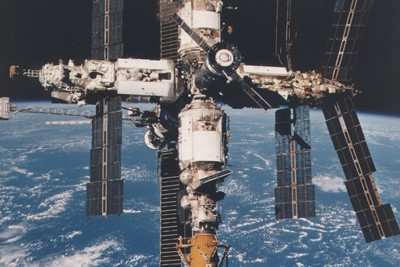Boos and Hisses
The safety of crew-members aboard the International Space Station (ISS) has been foremost on the minds of NASA and Roscosmos personnel since a Russian Soyuz capsule (MS22) docked to the ISS sprang a coolant leak on 14 December 2022, thereby calling into question the craft’s space-worthiness.

In addition to conveying crewmembers to the ISS, Soyuz capsules act as lifeboats in which station personnel may shelter or escape the orbital facility outright in the event of emergency. NASA astronaut Frank Rubio and Russian cosmonauts Sergey Prokopyev and Dmitri Petelin traveled to the ISS aboard Soyuz MS-22 last year and were scheduled to return to Earth in March 2023 via the same capsule. NASA and Roscosmos have spent the last months investigating the coolant leak’s cause, assessing the damage to MS-22, and evaluating means by which to solve the conundrums inherent the loss of the Soyuz capsule and the redundancy it represented.
Officials of Roscosmos, Russia’s space corporation and arbiter of all Russian Federation extraterrestrial activities, have announced the postponement of a planned 19 February 2023 mission that was to have seen a Soyuz spacecraft rendezvous with the ISS for purpose of retrieving Prokopyev, Petelin, and Rubio from the orbital facility and returning them safely to Earth.
Early in the week of 12 February, Russian technicians determined the Soyuz capsule by which Prokopyev, Petelin, and Rubio were to have been fetched home had sprung a leak similar to that by which Soyuz MS22 was afflicted. Roscosmos set forth that it would push the launch of the replacement spacecraft to March that engineers and planners might be afforded adequate time to investigate the problem and devise solutions thereto.
NASA, in a 15 February statement, refrained from specifying a date on which the replacement Soyuz capsule would depart for the ISS, stating only that the agency’s personnel were working with Roscosmos engineers “to investigate the cause of coolant loss from both” ships. NASA added: “the [ISS] crew is continuing with normal space station operations and scientific research.”
The contemporaneous occurrence of leaks on two Soyuz spacecraft has compelled NASA boffins and their Roscosmos counterparts to confront questions pertaining to cause, relation, and the probability of duplicate malfunctions arising.

As a matter of convention, ISS crews serve six-month duty-periods aboard the station, rotating back to Earth upon completion of their half-year stints. The removal from service of Soyuz capsules MS22 and MS23 stands to leave Prokopyev, Petelin, and Rubio stranded aboard the station and their replacements boots-down on Earth until September 2023.
Speaking to the subject of the ISS’s current crew, NASA space station program manager Joel Montalbano stated in January, “[they are] prepared to stay until the September launch date, if that’s the case. If that launch day moves up earlier, then they’re prepared to come home earlier.”
Space agency officials in the U.S. and Russia have posited the launch of the next ISS crew will likely be determined once a suitable replacement spacecraft has been launched to and docked with the station. NASA and Roscosmos are eager to get the replacement ship to the station insomuch as it would serve as an evacuation vehicle in the unlikely event of an emergency aboard the ISS.
In addition to Prokopyev, Petelin and Rubio, the ISS currently hosts NASA astronauts Nicole Mann and Josh Cassada, the Japan Aerospace Exploration Agency's Koichi Wakata, and Roscosmos’ Anna Kikina.
 ANN's Daily Aero-Term (04.25.24): Airport Rotating Beacon
ANN's Daily Aero-Term (04.25.24): Airport Rotating Beacon ANN's Daily Aero-Linx (04.25.24)
ANN's Daily Aero-Linx (04.25.24) Klyde Morris (04.22.24)
Klyde Morris (04.22.24) Airborne 04.24.24: INTEGRAL E, Elixir USA, M700 RVSM
Airborne 04.24.24: INTEGRAL E, Elixir USA, M700 RVSM Airborne 04.22.24: Rotor X Worsens, Airport Fees 4 FNB?, USMC Drone Pilot
Airborne 04.22.24: Rotor X Worsens, Airport Fees 4 FNB?, USMC Drone Pilot




